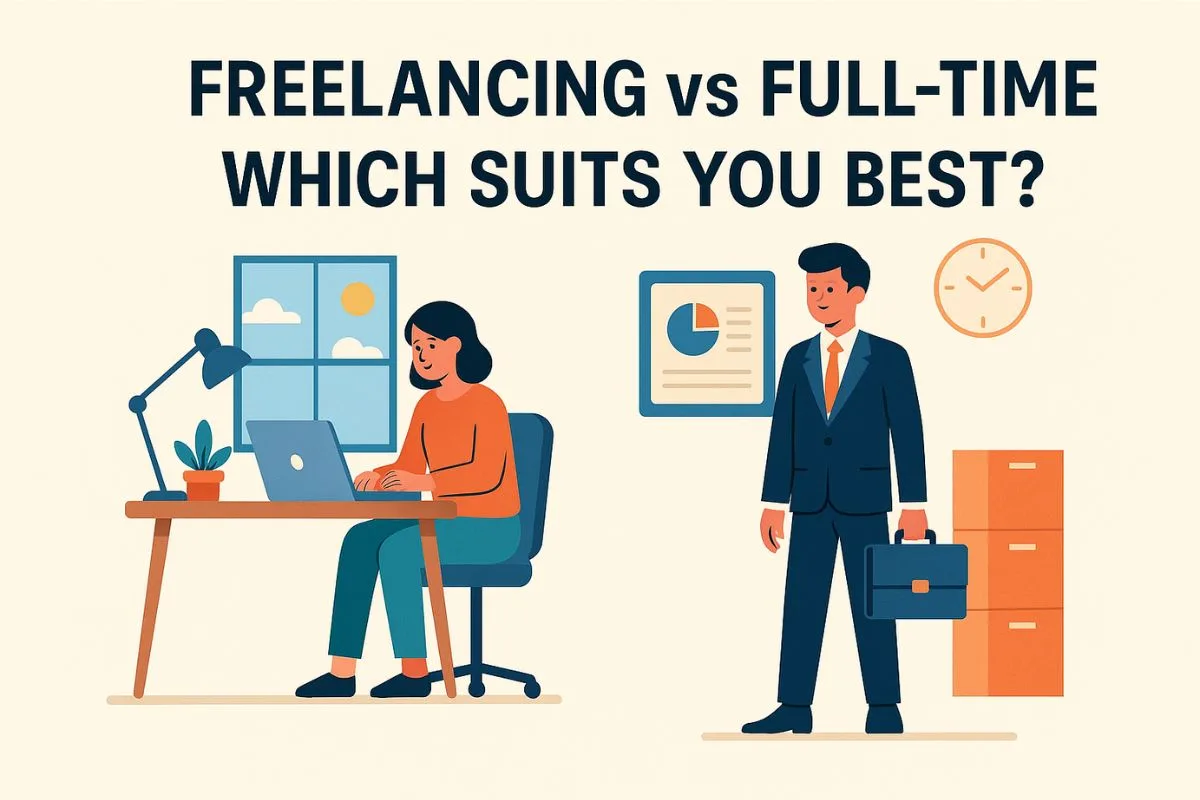If you’re reading this, you’re probably at a crossroads—wondering which path will offer the kind of career (and life!) you truly want. The big question, “Freelancing vs Full-Time Jobs: Which Suits You Best?” is more relevant now than ever. Millions are rethinking where, how, and why they work. But figuring out which path is right for YOU isn’t always easy.
This guide is here to help. Let’s break down what life really looks like in both worlds, so you can make the decision with confidence.
Understanding the Basics
What is Freelancing?
Freelancing is all about working for yourself. Instead of having just one employer, you handle projects for several clients, choosing when, where, and how you work. You’re totally in charge—from your schedule to your rates.
Key points about freelancing:
Flexible hours: Set your own work times.
Varied projects: Work on many different jobs, often for multiple clients.
Income varies: Your earnings depend on how many projects you land.
Self-reliant: You pay your own taxes and handle insurance.
What is a Full-Time Job?
A full-time job usually means working for a single company, following set hours (typically 9–5), and getting a monthly paycheck plus benefits. Your tasks and goals are defined by your employer.
Key points about full-time jobs:
Steady income: Regular, reliable paychecks.
Company benefits: Health insurance, paid leave, retirement plans.
Fixed schedule: Fewer surprises—your days are mapped out.
Clear career path: Built-in opportunities for promotion and skill growth.
Freelancing vs Full-Time Jobs: Pros & Cons
Let’s get real about what’s great—and what can be tough—about both freelancing and full-time jobs.
Freelancing: The Good and the Challenging
Benefits:
Ultimate flexibility: Pick your projects and work location.
Control over your time: Take breaks or vacations as you need.
Opportunity for higher income: Top freelancers can earn more per hour.
Diverse portfolio: Every client or project is a chance to learn something new.
Drawbacks:
Unpredictable cash flow: Some months are busier (and better paid) than others.
No built-in supports: Health insurance, paid leave, and retirement? You’re on your own.
Pressure to self-motivate: Meeting deadlines and managing clients falls completely on you.
Constant client hunt: Finding new projects never stops.
Full-Time Jobs: Why Some Thrive (and Some Don’t)
Benefits:
Job stability: A predictable salary can ease your mind.
Employee benefits: Health coverage, paid time off, and more.
Structured growth paths: Companies invest in training and promotion.
Teamwork: Daily collaboration and connection with colleagues.
Drawbacks:
Rigid schedules: Less freedom over when and where you work.
Potentially limited variety: Tasks can get repetitive.
Office politics: Navigating personalities is sometimes tricky.
Dependency: Your future is often tied to the company’s success.
A Day in Each Life: What Suits You Best?
Picture a day working as a freelancer:
You wake up, grab coffee, and get started when inspiration strikes. Maybe it’s at a co-working space, or from your kitchen table. By noon, you’ve finished a design for one client and started writing an article for another. Maybe you take a long walk—no need to ask anyone’s permission.
Now, imagine a typical day as a full-time employee:
You commute or log in from home at the same time every day. Your goals are clear, you meet with your manager or teammates, and you know when to expect your next paycheck. You also get paid vacation for that trip you’ve been planning.
When you compare freelancing vs full-time jobs this way, which scenario feels more appealing? Your answer reveals a lot about what you actually need from your career.
How to Choose: Questions to Ask Yourself
Not sure which path to pick? Here are some questions to guide your decision:
Do I like structure or do I crave freedom?
How do I handle unpredictable income?
Is having benefits like health care and paid holidays a top priority?
Am I self-driven enough to focus without a boss?
How important is variety in my daily work life?
Would I miss the social side of an office?
Tips for Making the Transition (Either Way)
Test before you leap: Try freelancing part-time before quitting your steady job—or ask about remote work or flexible hours at your current company if you’re considering a full-time switch.
Build a safety net: Save three to six months of living expenses to cover gaps.
Grow your skills: The more versatile you are, the more choices you’ll have, whether freelance or full-time.
Stay connected: Your network can open doors in both worlds—keep those relationships strong.
Plan for the long run: Think beyond next month. Where do you want your career (and life) to be in five years?
Conclusion: Freelancing vs Full-Time Jobs—Find Your Fit
Choosing between freelancing vs full-time jobs is a big step toward building a work life that makes you truly happy. Freelancing offers flexible freedom if you thrive on independence and change. Full-time jobs are a great match if you want security, structure, and a clear path forward. There’s no universal “right” answer—only what’s right for you.
Whatever path you pick, remember: your career should work for your life, not the other way around.
What’s Your Pick?
Are you leaning toward freelancing or a full-time job? Let us know in the comments! If you found this helpful, share it with a friend.
For more in-depth tips on freelancing, check out Upwork and Freelancers Union. Both offer great advice for newcomers.
FAQs: Freelancing vs Full-Time Jobs
1. Can I move from full-time work to freelancing easily?
Transitioning can be smooth with some planning. Start by freelancing after hours, build a client list, and make sure you have savings before making the leap.
2. Who handles insurance and retirement as a freelancer?
If you freelance, you’re responsible for your own health and retirement plans. Many freelancers get insurance through healthcare marketplaces or professional organizations.
3. Which pays more—freelancing or a full-time job?
It depends. Some freelancers out-earn salaried workers, especially in high-demand fields, but earnings can be unpredictable. With a full-time job, pay is consistent but may be capped.
4. What freelance skills are most in demand?
Digital marketing, copywriting, web development, and design skills are hot right now. Always keep an eye on what’s trending and upskill regularly.
5. How do freelancers stay focused?
Creating a daily routine, setting clear boundaries, and joining online communities can help keep you on track and motivated.








